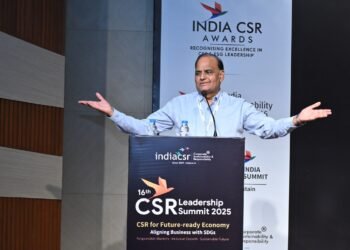NEW DELHI: Educate Girls addresses gender inequality in education. At the heart of EG’s model is a highly motivated, mission driven cadre of 10,000 volunteers called Team Balika who are role models, going door-to-door to identify out of school girls and convince their parents through multiple strategies to send them to school. India CSR Network interacts with Safeena Husain. Here is excerpt of Interview:
What was the inspiration behind Educate Girls?
My father has always supported all my choices, whether it was about living in an ashram (monastery) in Rishikesh or going abroad for studies. I am told several people had advised him against sending me (read a daughter) to a foreign land for higher education. Despite all the discouragement, he not just endorsed my decision but also helped me shortlist universities! The cause of girl child education is particularly very close to my heart because of certain personal experiences that I have been through. My education gave me the opportunity to be the person that I wanted to be. And I truly wanted to extend the same opportunity to numerous out-of-school girls who may not have support from their family like the way I received from my father.
Despite all the progess we have made, gender disparity in India remains a significant barrier to girls’ education. India is still a home to the largest number of illiterate women in the world (over 200 million) with 3 million eligible yet out-of-school girls and female literacy rate of 61%. The figures indicate that a large gender gap still exists in education, systematically excluding girls from school education and denying them the advantages of autonomy, mobility and economic opportunity that boys enjoy.
I returned to India in 2004 after having spent a decade in the US working on projects in underserved communities across continents and commenced groundwork here to set-up an organisation for girls’ education. After the success of my test and pilot projects, I founded Educate Girls in 2007. Our comprehensive model is focused on three objectives – increased enrollment and retention of girls and improved learning outcomes for all children.
In the last 10 years, Educate Girls has enrolled over 2, 00,000 out-of-school girls and has improved learning outcomes for 6,50,000 children till date.
What makes you different from the existing foundations working for the same cause?
While there are other credible non-profits in India and globally that are doing credible work for girls’ education, our program model and approach are entirely different.
Educate Girls perhaps is the only NGO that has systemic reform as its program model. It does not serve as a parallel delivery model or a single strategy solution like scholarships, or material support. Our programmatic interventions hinge around its community volunteers called the “Team Balika” – They are our eyes and ears on the ground with an understanding of the community dynamics and help us spread awareness and target behaviour change. Team Balika, with support from Educate Girls field staff, are involved in activities of enrolment, ensuring lower drop outs in schools and implementing the learning curriculum in classrooms.
Educate Girls program model is innovative in its approach toward engaging community members. Village education meets (Gram SikshaSabha) and Neighbourhood meetings (Mohalla meetings) are organized to bring about a change in the mindset of the community members encouraging them to promote the cause of girl child education and distribute responsibility between the village leaders, elders, school administration and the organizational staff and community volunteer.
Educate Girls model for school reform is designed specifically for hard to reach geographies (rural, remote and tribal regions). A cluster approach provides 100% coverage of an educationally backward district and allows Educate Girls to leverage its impact to enable grassroots change.
The model, through its holistic approach, bridges the gap between enrollment, retention and learning outcomes. What’s important is that the entire model is well structured and codified and therefore scalable and replicable.
What are your plans in terms of reach?
Educate Girls is currently operational in 15 educationally backward districts spread across Rajasthan and Madhya Pradesh. We are in the process of scaling up the present program (focused on primary education) to newer districts, preferably in the states of Madhya Pradesh, Bihar and Uttar Pradesh, to beable to achieve our goal of reaching 28 lac children annually by 2018.
Besides, extension of intervention into secondary education is on the cards for which a pilot project is underway in Ajmer. Going forward, we want to actively use technology to create an open source platform and disseminate both classroom content (curriculum targeting literacy and numeracy) and community content (community mobilization modules, data analysis from our census-like door-to-door survey) via technology tools. We are in talks with partners to help us build this. Constant improvisation of existing systems and processes is a given.
Given Educate Girls’ hyper-expansion phase, it is important to explore new partnerships for both funding and capacity-building. We are constantly on the lookout for partners who seek to establish a holistic and long-term engagement with the organization.
The world’s first Development Impact Bond (DIB) in education initiated by Educate Girls is a pioneering new way to encourage private investors to fund international development projects that are 100% focused on the outcomes achieved. The new funding tool has garnered interest of donors, investors as well as the government. We are hoping this could fuel scale.
Considerable progress has been made on our next 5-year strategy which should help us define the reach and the roadmap beyond 2018.
Why did you participated in SEOY India 2017 award, hosted by Jubilant Bhartia Foundation and Schwab Foundation?
The Jubilant Bhartia Foundation and the Schwab Foundation are at the vanguard of promoting and strengthening social entrepreneurship in India. Social entrepreneurship is often times an ignored area of nation building. And the SEOY award not only highlights and recognizes social entrepreneurship as a key element of inclusive nation growth but also provides a phenomenal platform like the WEF and unparalleled access to networks and partners who could contribute to our expansion in various capacities.
In the form of DIB (Development Impact Bond), Educate Girls has devised a comprehensive, evidence-based, outcomes-oriented funding mechanism and we need a platform like this to present it to the audience who are active participants in the process of development.
How important it is to be the part of platforms like SEOY (Social Entrepreneur of the year) and what are the plans if you win the award?
The SEOY and its associated networks is perhaps the most definitive melting pot of like-minded personalities. The platform brings together an eclectic group of individuals from diverse sectors and backgrounds, who are in it to contribute to the international development agenda. As Educate Girls operates at the intersection of education, gender, behavior change, advocacy and innovative financing, it is important for us to use platforms such as the SEOY to access networks for peer-to- peer support, learning and best practices.
Lest we forget, the SEOY award would lend immense credibility, recognition and clout to Educate Girls.
Where is social entrepreneurship landscape in India heading? And how important it is to maintain the momentum?
Social entrepreneurship landscape in India has evolved significantly over the last decade. People are increasingly using entrepreneurial skills in building innovative and sustainable enterprises to accelerate the country’s development process. Impact investors acknowledge the opportunities here and have therefore entered India’s social enterprise space contributing further to the eco-system.
The present landscape has necessitated for adequate infrastructure, policy and regulatory frameworks for such social enterprises to be able to execute solutions without negotiating on desired outcomes. Various stakeholders, including the government, have increasingly begun to recognize and appreciate the need to not just co-exist but also collaborate for greater impact.
While India’s economy has been growing, we have not managed to meet the same pace to counter the countless social problems plaguing the nation. It is therefore crucial we maintain the momentum; social enterprises have the potential to better the lives of a larger population thereby stepping-up India’s development.
Disclaimer: The views expressed by the interviewee in this feature are entirely her own and does not necessarily reflect the views of India CSR Network and its Editor.
Terms & Conditions: India CSR Network does not permit other Websites/Agency to copy or reproduce or reprint the above article/feature in any form.




















